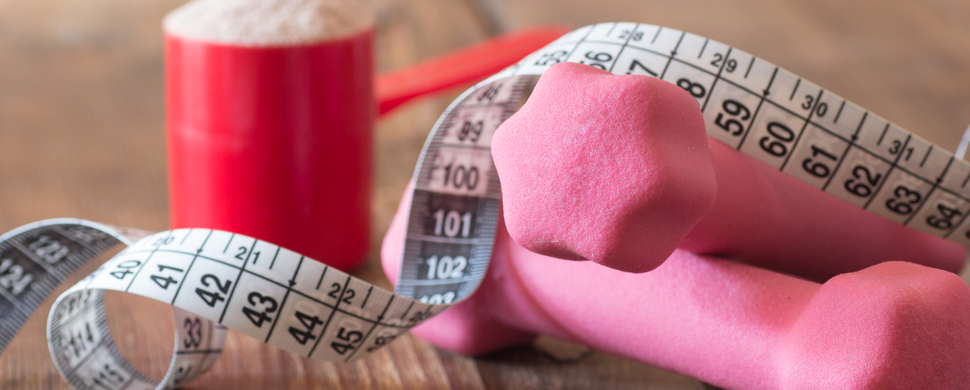Whey Protein for Weight loss - Why it works and what makes it so effective?
Not much is known about Little Miss Muffet, the young lady who, according to the nursery rhyme, "sat on
a tuffet, eating her curds and Whey.” But we can be reasonably sure that Miss Muffet wasn't overweight. That's because Whey Protein Powder—especially when consumed daily in a high-quality Whey protein shake—is one of the most effective weight-control nutrients known to science.
by Gerry Morton
3 Reasons Why Whey protein for Weight loss works
What makes Whey protein a best choice for Weight loss? or 3 reasons why Whey protein for Weight loss works. Whey is the liquid component of milk that is separated from the solid curd component in the cheese-making process.
Whey protein is actually not a single protein but a collection of proteins and protein fractions (or peptides) found naturally in the Whey component of milk. Whey protein promotes weight loss in three key ways. First, protein in general reduces hunger and eating more, than carbohydrates and fats, and Whey protein does so even better than other proteins. In addition, Whey protein reduces fat storage compared to carbs, fats, and other proteins. And finally, Whey protein enhances the fat-burning effects of exercise. Let's take a closer look at each of these weight-control benefits of whey protein, what makes Whey protein, a best choice for weight loss —and what they mean to you.
1) Whey protein reduces hunger, so you consume fewer calories.

To lose excess body fat, it is almost always necessary to reduce the number of calories you consume each day. However, in many cases this is easier said than done, because reducing calorie consumption increases hunger and the desire to eat. Most of us can resist hunger for a few days, but few of us can resist hunger for more than a few weeks. That's why most weight-loss diets don't last very long.
Permanent fat loss can only be achieved if calorie consumption is reduced in a way that does not cause persistent hunger. Switching to a high-protein reduced-calorie diet is one way to attain this balance. As I mentioned above, gram for gram, calorie for calorie, protein produces more satiety (fullness) than either carbohydrate or fat. Therefore, by increasing the number of calories you get from protein at the same time you reduce the total number of calories you consume in a day, you can avoid hunger and more easily stay consistent with your diet, so that fat loss becomes permanent.
In a recent study from the University of Washington School of Medicine, 19 subjects were fed each of three diets sequentially. For two weeks they followed a weight-maintenance diet comprising 15 percent protein, 35 percent fat, and 50 percent carbohydrate. For the next two weeks they followed a high–protein diet of equal calories. The macronutrient breakdown of this diet was 30 percent protein, 20 percent fat, and 50 percent carbohydrate. Finally, the subjects switched to a high-protein diet with the same macronutrient breakdown but no calorie restriction—subjects were allowed to eat as much or as little as they pleased (or "ad libitum”). They stayed on this last diet for 12 weeks.
The authors of the study reported that when subjects switched from the low-protein weight maintenance diet to the high-protein weight maintenance diet, they started feeling much fuller despite the fact that they were consuming the same number of calories. Even more significant, during the unrestricted high-protein diet phase, the subjects voluntarily reduced their daily eating by 441 calories per day and lost almost 11 pounds, including more than 8 pounds of body fat, on average.
Research has shown that some proteins reduce hunger more than others. And it so happens that Whey protein reduces hunger more than most. One study found that a Whey protein "appetizer” reduced appetite for two hours, compared to just one hour for soy protein, while an egg protein appetizer actually increased appetite.
What makes Whey Protein more filling?
Certain forms of Whey protein contain high levels of a peptide called glycomacropeptide (GMP), which is known to be a powerful satiety (or hunger-quenching) nutrient. It works by stimulating the release of cholecystokinin (CCK), a hormone that's responsible for controlling hunger. In one study, GMP from Whey Protein increased CCK release by 415 percent. In another study, a supplement containing GMP reduced the number of calories consumed in a meal by 20 percent compared to a placebo when consumed before the meal.
In addition to stimulating CCK, Whey protein reduces hunger by lowering circulating levels of the hunger hormone ghrelin. A recent Australian study found that a Whey protein drink produced a prolonged suppression of ghrelin compared to glucose and fructose beverages. Whey also causes fullness by activating opioid receptors in the gut. Specific peptides contained in Whey bind to these opioid receptors, which then communicate with the brain to produce that pleasant feeling of fullness that makes you put down the fork.
Bottomline, taking Whey Protein for Weight loss can be a very effective way to control hunger and consume fewer calories.
2) Whey protein blocks fat storage

An intriguing new line of research suggests that Whey promotes body fat loss by blocking fat storage. In a recent French study, laboratory animals were fed a normal diet, a high-protein diet, or a Whey-enriched high-protein diet for 42 days. At the end of the study period, the animals fed the Whey diet weighed 30 percent less than those fed the normal diet and 17 percent less than those fed the regular high-protein diet, yet the Whey-fed animals had the highest levels of lean body mass of the three groups. The researchers conducting the study attributed these results to reduced fat storage caused by the high concentrations of branched-chain amino acids in the Whey product used.
Whey is, of course, a dairy protein, and a number of recent human studies have shown that increased dairy intake has beneficial effects on body composition. Much of this research has been done at the University of Tennessee. In one of these studies, 34 obese adults were placed on a balanced, modestly reduced-calorie diet for 12 weeks. Half of them consumed small amounts of dairy foods while the other half consumed three servings of low-fat yogurt daily. The subjects on the dairy-rich version of the diet lost 22 percent more weight, 66 percent more body fat and 81 percent more trunk fat compared to those who simply reduced calories and consumed little or no dairy. The participants who ate three servings of yogurt also lost significantly more inches around the waist compared to those on the low-dairy diet.
Scientists are still trying to figure out how dairy foods boost fat loss in dieters, but they believe calcium plays a pivotal role. Calcium is a crucial player in fat metabolism and appears to both reduce fat storage and increase fat burning when consumed at adequate levels (roughly 1,200 mg per day) during periods of calorie restriction. But calcium is clearly not the whole story, because studies pitting dairy foods and calcium supplements head-to-head have found that dairy foods are far more effective. At least half of the fat storage-reducing effect of dairy foods is attributable to two specific components of Whey: branched chain amino acids (particularly leucine) and a protein fraction known as ACE inhibiting peptide.
Whey protein supplements are the perfect alternative to both whole dairy foods (some of which are high in calories) and calcium supplements. A single serving of EnergyFirst ProEnergy Whey Protein Isolate contains 95 mg of calcium and only 90 calories (72 of them from protein).
Consuming Whey Protein for Weight loss makes sure you lose the fat and build lean mass.
3) Whey Protein Weight Loss Whey Protein enhances the fat burning effects of exercise

Exercise is essential for optimal health and for developing and maintaining a lean body composition.
Exercise burns excess body fat and builds lean muscle, which raises the body's metabolic rate, resulting in even more fat burning. High-protein diets are proven to boost the effectiveness of exercise. In a study from the University of Illinois, women were put on either a high-protein or a low-protein reduced-calorie diet and an exercise program. The women in both groups lost equal amounts of weight, but the women on the high-protein diet lost much more fat. That's because the women on the low-protein diet lost a lot of muscle. In fact, one-third of their weight loss was muscle weight.
A high-protein diet can also help you "convert” fat to muscle if you're more interested in gaining muscle than losing weight. Numerous studies have shown that individuals engaging in weightlifting gain more muscle on a high-protein diet than they do on a moderate- or low-protein diet. The United States Recommended Daily Allowance for protein is roughly 0.36 gram per pound of body weight. But a study published in the Journal of Applied Physiology found that muscle mass gains resulting from weightlifting continue to increase all the way up to a protein intake of 0.63 gram per kilogram of body weight daily.
That's nearly twice the USRDA.
The unique amino acid profile of Whey protein makes it a better muscle builder than regular food protein sources such as beef and other supplemental protein sources such as casein. A Canadian study published in the Journal of Applied Physiology compared the effects of Whey protein and casein supplementation (casein is another dairy protein) on body composition in young adults engaging in a 30-day resistance-training program. Subjects taking the Whey protein supplement improved their body composition significantly more than subjects taking the casein supplement. All these make Whey protein an excellent choice for weight loss.
Choosing The Right Whey Protein - All Whey Protein Powder are not made equal So, how do you take advantage of all of this science to manage your own weight with Whey protein?
Powdered Whey protein drink mixes represent the most convenient and calorically efficient way to supplement with Whey protein. Many of these products contain little else besides Whey. All you have to do is add a scoop or two to eight to 12 ounces of water (the precise mixing directions vary by brand), mix it up, and gulp it down.
There are dozens of different brands of powdered Whey protein shakes on the market. You might think that all of them are more or less the same, but there are actually significant differences in the composition—and therefore also in the effectiveness—of different products. The two things to watch out for when choosing a Whey protein shake are low-quality Whey protein and unnatural ingredients.
Different processing methods are used to produce Whey protein powders. The highest-quality Whey proteins are Whey protein isolates produced through cross-flow microfiltration. Cross-flow microfiltration is a costly process that produces a very high concentration of intact proteins while also preserving the full range of Whey protein peptides and their distinct benefits. In alternative processes such as ion exchange, which involves the use of chemicals, many of these peptides are lost. Makers of ion-exchange Whey products boast of the higher percentage of intact proteins in these products, but it's a misguided boast, because it's the protein peptides that make Whey special and unique compared to other proteins.
Most Whey protein shakes contain some source of sweetness and flavoring in addition to Whey protein. In the typical Whey protein shake, these ingredients are artificial. I recommend that you choose a product that is flavored and sweetened naturally, with an ingredient such as Stevia. Also, most Whey protein shakes contain some fat and cholesterol, while the very best products do not.
To enjoy the weight-control benefits of your chosen Whey protein shake, drink one to three servings each day. The best times to drink your Whey protein shake are at breakfast, between meals, before and after workouts, and before you go to bed. Make a Whey protein shake a part of your daily nutrition regimen and soon you will be as lean and healthy as Little Miss Muffet undoubtedly was!
- David S Weigle, Patricia A Breen, Colleen C Matthys, Holly S Callahan, Kaatje E Meeuws, Verna R Burden and Jonathan Q Purnell. "A high-protein diet induces sustained reductions in appetite, ad libitum caloric intake, and body weight despite compensatory changes in diurnal plasma leptin and ghrelin concentrations.” American Journal of Clinical Nutrition. Vol. 82, No. 1, 41-48, July 2005.
- Royle PJ, McIntosh H, Clifton PM. "Whey protein isolate and glycomacropeptide decrease weight gain and alter body composition in male Wistar rats.” British Journal of Nutrition. 2007 Dec 6;:1-6.
- Anderson GH, Tecimer SN, Shah D, Zafar TA. "Protein source, quantity, and time of consumption determine the effect of proteins on short-term food intake in young men.” Journal of Nutrition. 2004 Nov;134(11):3011-5.
- Bowen J, Noakes M, Clifton PM. "Appetite hormones and energy intake in obese men after consumption of fructose, glucose and whey protein beverages.” International Journal of Obesity. 2007 Nov;31(11):1696-703.
- Belobrajdic DP, McIntosh GH, Owens JA. "A High-Whey-Protein Diet Reduces Body Weight Gain and Alters Insulin Sensitivity Relative to Red Meat in Wistar Rats.” The Journal of Nutrition. 134:1454-1458, June 2004.
- Zemel MB, Richards J, Mathis S, Milstead A, Gebhardt L, Silva E. "Dairy augmentation of total and central fat loss in obese subjects.” International Journal of Obesity. 2005 Apr;29(4):391-7.
- Lemon PW, Tarnopolsky MA, MacDougall JD, Atkinson SA. "Protein requirements and muscle mass/strength changes during intensive training in novice bodybuilders.” Journal of Applied Physiology. 1992 Aug;73(2):767-75. Cribb P, Williams A, Carey M, 2006. "The effect of whey isolate on strength, body composition and plasma glutamine". Medicine and Science in Sports and Exercise. 34(5):S299.














